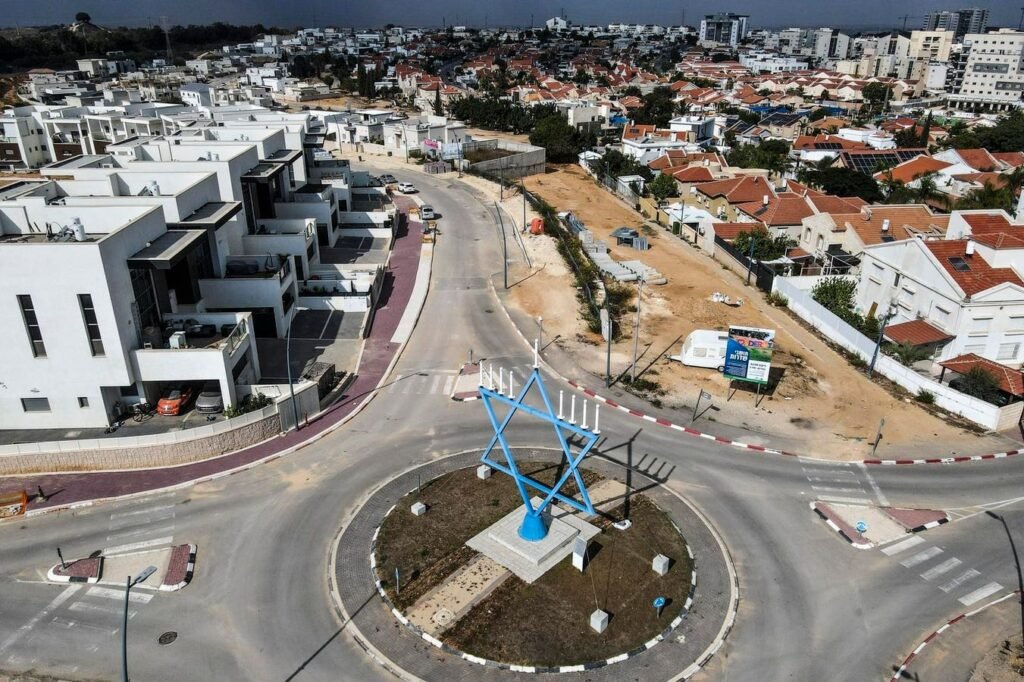An empty street in Sderot, southern Israel, Saturday, November 18, 2023. The Israeli government … [+]
BionicHIVE, an Amazon-backed Israeli robotics startup, and Carrar, a startup developing battery modules and thermal management systems for electric vehicles (EVs), are both based in Sderot, a small desert town less than a mile from Gaza. The companies were founded and run by hard-working people who live and work in an arid region that has endured relentless rocket attacks for more than two decades and terrorist attacks for seven decades.
BionicHive’s SqUID robot is equipped with built-in cameras and sensors to navigate warehouse floors and climb shelves. Guided by AI algorithms, it sorts, picks, and puts away packages precisely and efficiently. Virtually error-free and scalable, the SqUID robot fleet adapts to a warehouse’s existing structure and operations, increasing storage space while reducing costs by 35% to 50% per warehouse transaction, working alongside humans and even in dark warehouses. “Logistics and supply chains are like emergency services,” says co-founder and CEO Liran Raizer, and they require automation that is flexible, efficient, and scalable.
BionicHIVE’s flexible bot, SqUID
Three years ago, after seeing a video of SqUID in action, Elon Musk tweeted, “The future of robots is coming.” A year later, BionicHIVE received funding from the Amazon Industrial Innovation Fund for “a differentiated solution that optimizes safety for repetitive tasks at any height in the supply chain workplace, and a technology that advances innovation.” The World Economic Forum said of SqUID and warehouse automation, “Some tasks, such as repetitive or dangerous tasks, are better suited to robots. Additionally, in countries with labor shortages, robots can reduce employment and wage costs.”
Last year, Maersk announced a pilot project with BionicHive at its Mira Loma, California, warehouse, and BionicHive plans to conduct pilot projects with two more customers in the near future. The company has raised $15 million to date.
Carrar is developing commercial automotive-grade battery modules for EVs that triple battery life using innovative internal thermal management based on two-phase immersion technology. “We leverage the liquid-to-vapor transition, similar to air conditioning technology,” said Avinoam Rubinstain, founder and CEO of Carrar. Addressing key challenges in the EV industry, including battery safety, lifespan and cost, the company aims to “provide optimal performance for electric vehicles in all weather conditions and improve passenger safety while reducing the environmental impact of EV batteries,” said Rubinstain.
Karrall has raised $11 million to date and is testing its batteries with Volvo, Volkswagen and GM. Its target market, thermal management and battery modules and packs, is projected to reach $66 billion by 2030.
Carrar battery module
The October 7 Hamas terrorist attack on Sderot and nearby agricultural settlements presented the two startups with new and difficult challenges. Many employees were called up to reserve duty or evacuated from their homes as the Israeli government declared the area a closed security zone. But BionicHIVE and Carrar quickly resumed (almost) normal operations. Carrar had a November deadline for a project with Volvo. Employees worked hard, sacrificing weekends to fly back and forth between Israel and Germany to meet the deadline. BionicHIVE had planned to show off its robot at a major trade show in the United States in February. With a significantly reduced workforce and working from various remote offices, they achieved their goal and presented SqUID at the trade show.
In December 2023, the Israel Innovation Authority announced that several key government ministries will work together to invest more than NIS 100 million to establish nine new regional innovation centers across Israel. The innovation centers will foster the emergence and growth of new startups with strong ties to the community and promote high-tech jobs in selected areas. One of these areas will be the Western Negev Tech Center for Security and Resilience, which will operate a center in the Gaza border area and focus on homeland security and nutritional resilience.
“We see ourselves as an island of stability for our employees,” says Karrer’s Rubinstein. BionicHive’s Reiser says his company is “part of a movement of tech companies that really believe in the South, and that’s part of our message to the world. We want to remain here as a hub for people who believe in this region.”

